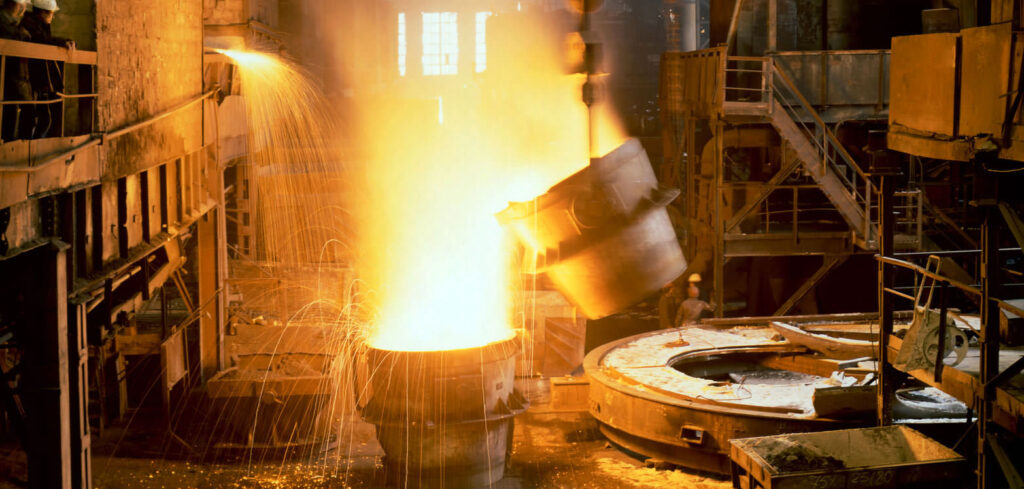Steel manufacturers face difficulties in rising production costs, fluctuating demand, and inefficient supply chain management. Without a centralized system, businesses often struggle with inventory mismanagement, production bottlenecks, and missed deadlines. These imperfections not only lead to financial losses but also affect overall productivity and aggressiveness in the market.
This is where ERP software for the steel manufacturing industry becomes a game-changer. ERP helps manufacturers optimize processes, improve resource allocation, and reduce costs by applying all business functions- from procurement to production planning.
In this guide, we’ll break down how ERP for steel manufacturing tackles these challenges, the essential features steel manufacturers need, and how to choose the right solution for your business.
Table of Contents
- Introduction: The Challenges of Steel Manufacturing:
- Why Steel Production is Complex & Highly Competitive?
- The Need for Digital Transformation in the Steel Industry
- How ERP Software Solves These Challenges?
- Growing Demand for ERP in the Steel Manufacturing Industry:
- Global Trends Driving ERP Adoption in Steel Industry:
- Industry-Specific Challenges ERP Can Solve:
- Key Features of ERP Software for Steel Industry:
- 1. Production Planning & Scheduling:
- 2. Inventory & Material Management:
- 3. Quality Control & Compliance:
- 4. Supply Chain & Logistics Management:
- 5. Financial Management & Cost Control
- How ERP Streamlines Steel Manufacturing Operations:
- Automating Manual Processes to Increase Efficiency:
- Enhancing Decision-Making with Real-Time Data Analytics:
- Reducing Operational Costs & Optimizing Resource Utilization:
- Inventory Management with ERP: How It Reduces Costs
- 1. Real-Time Inventory Tracking:
- 2. Minimizing Waste & Material Loss:
- 3. Better Supplier Coordination
- ERP in Steel Industry: Improving Production Planning & Scheduling
- How ERP Helps Optimize Production Schedules?
- Managing Work Orders:
- Predictive Analytics for Demand Forecasting:
- ERP & Supply Chain Management in Steel Manufacturing:
- Tracking Raw Material Supply:
- Real-Time Logistics & Distribution Optimization:
- Demand & Supply Alignment for Cost Efficiency:
- Financial Oversight: Managing Costs & Increasing Profitability
- Automated Invoicing, Budgeting & Tax Compliance:
- Cost Analysis & Revenue Optimization with ERP:
- ERP Implementation in Steel Industry: Steps & Best Practices
- Step-by-Step Guide to Choosing the Right ERP Software
- Common Implementation Challenges & How to Overcome Them
- Training Your Team for ERP Adoption
- Conclusion:
Introduction: The Challenges of Steel Manufacturing:
Steel manufacturing is a complex industry facing challenges like high production costs, supply chain disruptions, inventory mismanagement, and regulatory compliance. Without streamlined processes, inefficiencies can impact profitability, making ERP solutions essential for optimizing operations and enhancing productivity. Now, check why ERP for steel manufacturing production is high competitive.
Why Steel Production is Complex & Highly Competitive?
Steel production is highly complex and competitive due to fluctuating raw material costs, energy-intensive processes, strict industry regulations, and global demand shifts. Manufacturers must boost efficiency, reduce waste, and manage perfection standards to stay commercial in this fast-evolving industry.
The Need for Digital Transformation in the Steel Industry
The steel industry must embrace digital transformation to enhance efficiency, reduce costs, and stay competitive. Automation, IoT, and ERP software streamline operations, improve supply chain management, and enable real-time data analysis, driving smarter decision-making and sustainable growth.
How ERP Software Solves These Challenges?
ERP solution solves the challenges of the steel industry by implementing production, inventory, and supply chain management into a single platform. It enhances efficiency, reduces costs, improves compliance, and enables real-time decision-making, ensuring smoother operations and increased profitability for steel manufacturers.

Growing Demand for ERP in the Steel Manufacturing Industry:
The need for ERP in manufacturing is increasing as companies find to smoothly manage their production, inventory, and supply chain management. With this enormous increase in competition and operational complexities, ERP solutions help manufacturers improve efficiency, reduce costs, and enhance overall business performance.
Global Trends Driving ERP Adoption in Steel Industry:
The adoption of ERP in the steel industry is driven by trends like automation, AI integration, cloud computing, and data-driven decision-making. As global competition intensifies, manufacturers leverage ERP solutions to enhance efficiency, improve supply chain management, and ensure regulatory compliance.
Industry-Specific Challenges ERP Can Solve:
Steel manufacturers face unique challenges that can impact efficiency, profitability, and compliance. ERP software addresses these issues by providing integrated solutions for:
- Inventory Management – Prevents stock shortages and overstocking with real-time tracking.
- Cost Control – Optimizes resource allocation, reducing production and operational costs.
- Quality Management – Ensures compliance must be suitable with industry standards through automated quality checks.
- Supply Chain Optimization – Enhances vendor coordination and raw material procurement.
- Production Scheduling – Reduces downtime and improves workflow efficiency.
By leveraging ERP solutions, steel manufacturers can streamline operations, enhance decision-making, and achieve greater profitability in a highly competitive industry.

Key Features of ERP Software for Steel Industry:
Enterprise Resource Planning (ERP) software plays a critical role in optimizing steel manufacturing by automating key processes, enhancing efficiency, and improving cost control. Below are the following features of this ERP software for Manufacturing industry:
1. Production Planning & Scheduling:
- Automates workflows, ensuring optimal utilization of machinery and labor.
- Reduces downtime by predicting maintenance needs and preventing production bottlenecks.
- Enhances demand forecasting, allowing manufacturers to plan production efficiently.
2. Inventory & Material Management:
- Real-time stock tracking minimizes shortages and overstocking.
- Ensures efficient raw material utilization, reducing waste and lowering costs.
- Provides automated reordering based on demand trends.
3. Quality Control & Compliance:
- Ensures adherence to international steel production standards.
- Automates quality checks at various production stages.
- Maintains detailed compliance reports, reducing regulatory risks.
4. Supply Chain & Logistics Management:
- Streamlines procurement, vendor management, and raw material tracking.
- Enhances logistics coordination for on-time delivery.
- Aligns supply with demand, preventing production delays.
5. Financial Management & Cost Control
- Automates budgeting, invoicing, and financial reporting.
- Helps track operational costs, improving profitability.
- Enables data-driven financial decision-making for long-term sustainability.
By integrating these features, ERP software empowers steel manufacturers to streamline operations, enhance productivity, and maintain a competitive edge in the market.

How ERP Streamlines Steel Manufacturing Operations:
In the steel manufacturing industry, operational efficiency is critical for maintaining profitability, quality, and competitiveness. ERP software helps streamline processes by automating workflows, enhancing data-driven decision-making, and optimizing resource utilization, ultimately reducing costs and improving productivity.
Automating Manual Processes to Increase Efficiency:
Traditional steel manufacturing involves time-consuming manual tasks, leading to delays and human errors. ERP software automates key processes such as order management, production scheduling, and inventory tracking, ensuring seamless operations. Automated workflows reduce dependency on manual data entry, minimizing errors while improving accuracy and speed across production cycles.
Enhancing Decision-Making with Real-Time Data Analytics:
Steel manufacturers must adapt to fluctuating market demand, raw material costs, and production constraints. ERP systems provide real-time data analytics, offering deep insights into production performance, supply chain trends, and cost fluctuations. This empowers decision-makers with accurate forecasting, better resource allocation, and proactive problem-solving, leading to higher efficiency and profitability.
Reducing Operational Costs & Optimizing Resource Utilization:
ERP software helps steel manufacturers control costs by monitoring resource consumption, optimizing machine utilization, and preventing overproduction. By analyzing energy usage, material costs, and labor efficiency, companies can reduce waste and improve financial management.
By integrating automation, analytics, and cost control, ERP solutions transform steel manufacturing operations, ensuring smoother workflows, reduced expenses, and increased profitability.
Inventory Management with ERP: How It Reduces Costs
Effective inventory management is crucial in steel manufacturing, where raw material costs fluctuate, and excess stock can lead to financial losses. ERP software optimizes inventory control by tracking stock in real-time, minimizing waste, and improving supplier coordination, ultimately reducing operational costs:
| FeatureHow It HelpsCost-Saving Benefit | Real-Time Inventory Tracking | Monitors stock levels and automates restocking | Prevents shortages and excess stock | Smart Inventory Control Systems | Tracks raw material usage and reduces waste | Lowers material loss and scrap | Automated Order Management | Optimizes purchasing based on production needs | Reduces over-purchasing and storage cost | Supplier Coordination & JIT Production | Ensures timely deliveries and minimizes stockpiling | Cuts storage costs and enhances cash flow | Demand Forecasting | Uses analytics to predict material needs | Prevents unnecessary procurement |
1. Real-Time Inventory Tracking:
Steel manufacturers often struggle with stock imbalances—either running out of essential materials or overstocking, which ties up capital. ERP software provides real-time inventory tracking, allowing businesses to monitor stock levels, predict demand accurately, and automate replenishment orders. This ensures that materials are always available without excess storage costs.
2. Minimizing Waste & Material Loss:
Manual inventory management often leads to material waste, misplacements, and inefficiencies. ERP systems track raw materials, monitor expiration dates, and ensure optimal utilization, reducing scrap and losses. By integrating smart inventory control systems, manufacturers can significantly cut down on waste and maximize resource efficiency.
3. Better Supplier Coordination
ERP software streamlines supplier communication and order processing, ensuring raw materials arrive just in time for production. This minimizes storage costs, enhances cash flow, and prevents material shortages, leading to cost-effective, demand-driven manufacturing.
By leveraging ERP for inventory management, steel manufacturers can reduce waste, optimize resources, and achieve better financial control, ensuring higher profitability and sustainable growth.
ERP in Steel Industry: Improving Production Planning & Scheduling
Improve production planning and scheduling are necessary in the steel industry to decrease downtime, optimize resource utilization, and meet market demand. ERP software enhances these processes by automating scheduling, managing work orders, and using predictive analytics for demand forecasting.
How ERP Helps Optimize Production Schedules?
ERP software automates production scheduling, ensuring that manufacturing runs smoothly and efficiently. By analyzing real-time order data, machine availability, and workforce capacity, ERP aligns production schedules with market demand and material availability, reducing lead times.
Managing Work Orders:
Work order management is crucial in steel manufacturing, where multiple processes need to be synchronized. ERP automates work order tracking, ensuring smooth workflow execution. Additionally, predictive maintenance tools help monitor machine health, reducing unexpected breakdowns and extending equipment lifespan.
Predictive Analytics for Demand Forecasting:
Steel demand fluctuates based on market trends, raw material availability, and economic conditions. ERP-powered predictive analytics uses past sales data and real-time market conditions to forecast demand accurately, helping manufacturers avoid overproduction or shortages.

ERP & Supply Chain Management in Steel Manufacturing:
A well-optimized supply chain is crucial for steel manufacturers to maintain production efficiency, reduce costs, and meet customer demands. ERP software integrates supply chain processes, ensuring seamless raw material tracking, vendor coordination, real-time logistics, and demand-supply alignment.
Tracking Raw Material Supply:
Steel production relies on raw material availability from multiple suppliers. ERP automates procurement, tracks shipments, and ensures vendor compliance, reducing material shortages and production delays.
Real-Time Logistics & Distribution Optimization:
ERP integrates logistics management, offering real-time shipment tracking, optimized route planning, and warehouse coordination, reducing transportation costs and delays.
Demand & Supply Alignment for Cost Efficiency:
By using predictive analytics, ERP ensures that steel manufacturers align production with market demand, avoiding excess inventory and reducing storage costs.
Implementing ERP in supply chain management ensures greater efficiency, cost savings, and seamless production flow, making it a must-have solution for steel manufacturers.
Financial Oversight: Managing Costs & Increasing Profitability
Effective financial management is crucial in the steel manufacturing industry, where fluctuating raw material costs, energy expenses, and operational inefficiencies impact profitability. ERP software provides real-time financial oversight, ensuring cost control, automated invoicing, and revenue optimization for sustainable growth.
Automated Invoicing, Budgeting & Tax Compliance:
Manual invoicing and budgeting can lead to errors, delayed payments, and compliance issues. ERP automates these processes, ensuring seamless billing, tax calculations, and financial forecasting, reducing risks and improving cash flow.
Cost Analysis & Revenue Optimization with ERP:
ERP enables steel manufacturers to track expenses, analyze revenue trends, and optimize pricing strategies. With real-time financial insights, businesses can cut unnecessary costs, boost profits, and maintain long-term sustainability.
ERP Implementation in Steel Industry: Steps & Best Practices
Implementing ERP software in the steel industry requires careful planning, as it impacts production, inventory, supply chain, and financial management. A well-structured approach ensures smooth integration, minimizes disruptions, and maximizes operational efficiency.
Step-by-Step Guide to Choosing the Right ERP Software
- Assess Business Needs – Identify pain points like inventory mismanagement, production bottlenecks, or financial inefficiencies.
- Research ERP Solutions – Compare on-premise vs. cloud ERP and analyze features tailored for steel manufacturing.
- Select a Scalable ERP System – Ensure it supports future growth, automation, and integration with existing tools.
- Evaluate Vendor Support – Choose an ERP provider with industry experience and strong technical support.
- Plan for Implementation & Data Migration – Migrate data systematically while ensuring zero operational downtime.
Common Implementation Challenges & How to Overcome Them
- Resistance to Change → Provide early communication & employee involvement.
- Data Migration Issues → Perform data audits & backup critical information.
- Integration with Existing Systems → Choose ERP with flexible API compatibility.
Training Your Team for ERP Adoption
- Conduct hands-on training sessions to ensure seamless ERP usage.
- Assign ERP champions within teams for smoother transition.
- Offer ongoing support & troubleshooting assistance post-implementation.
Conclusion:
Implementing ERP software for the steel manufacturing industry is no longer optional—it’s essential for staying competitive, reducing costs, and optimizing operations. From inventory management and production planning to financial oversight and supply chain coordination, ERP streamlines every aspect of your business, ensuring higher efficiency and profitability.
By choosing the right ERP solution tailored for steel manufacturing, you can eliminate inefficiencies, improve decision-making, and drive sustainable growth. Now is the time to embrace digital transformation and take your manufacturing operations to the next level.
Ready to optimize your steel business? Contact us today to discover how our ERP solution can revolutionize your operations!

